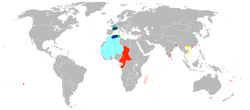 Global Information
Global InformationVichy France information
French State État français (French) | |||||||||||||||||
|---|---|---|---|---|---|---|---|---|---|---|---|---|---|---|---|---|---|
| 1940–1944[1] | |||||||||||||||||
 Flag
 Cartouche
| |||||||||||||||||
| Motto: "Travail, Famille, Patrie" ("Work, Family, Fatherland") | |||||||||||||||||
| Anthem: "La Marseillaise" (official) "Maréchal, nous voilà !" (unofficial)[2] ("Marshal, here we are!") | |||||||||||||||||
 The French State in 1942:
| |||||||||||||||||
 The gradual loss of all Vichy territory to Free France and the Allied powers | |||||||||||||||||
| Status |
| ||||||||||||||||
| Capital |
| ||||||||||||||||
| Capital-in-exile | Sigmaringen | ||||||||||||||||
| Common languages | French | ||||||||||||||||
| Government | Provisional republic under a collaborationist authoritarian dictatorship | ||||||||||||||||
| Chief of State | |||||||||||||||||
• 1940–1944 | Philippe Pétain | ||||||||||||||||
| Prime Minister | |||||||||||||||||
• 1940–1942 | Philippe Pétain | ||||||||||||||||
• 1940 (acting) | Pierre Laval | ||||||||||||||||
• 1940–1941 (acting) | P.É. Flandin | ||||||||||||||||
• 1941–1942 (acting) | François Darlan | ||||||||||||||||
• 1942–1944 | Pierre Laval | ||||||||||||||||
| Legislature | National Assembly | ||||||||||||||||
| Historical era | World War II | ||||||||||||||||
• Second Compiègne | 22 June 1940 | ||||||||||||||||
• Pétain given full powers | 10 July 1940 | ||||||||||||||||
• Operation Torch | 8 November 1942 | ||||||||||||||||
• Case Anton | 11 November 1942 | ||||||||||||||||
• German retreat | Summer 1944 | ||||||||||||||||
• Vichy laws repealed | 9 August 1944[1] | ||||||||||||||||
• Capture of the Sigmaringen enclave | 22 April 1945 | ||||||||||||||||
| Currency | French franc | ||||||||||||||||
| |||||||||||||||||
| |||||||||||||||||
| History of France |
|---|
 |
| Topics |
|
| Timeline |
|
|
Vichy France (French: Régime de Vichy; 10 July 1940 – 9 August 1944), officially the French State (État français), was the French rump state headed by Marshal Philippe Pétain during World War II. It was named after its seat of government, the city of Vichy. Officially independent, but with half of its territory occupied under the harsh terms of the 1940 armistice with Nazi Germany, it adopted a policy of collaboration. Though Paris was nominally its capital, the government established itself in the resort town of Vichy in the unoccupied "free zone" (zone libre), where it remained responsible for the civil administration of France as well as its colonies.[3] The occupation of France by Nazi Germany at first affected only the northern and western portions of the country, but in November 1942 the Germans and Italians occupied the remainder of Metropolitan France, ending any pretence of independence by the Vichy government.
The Third French Republic had begun the war in September 1939 on the side of the Allies. On 10 May 1940, it was invaded by Nazi Germany. The German Army rapidly broke through the Allied lines by bypassing the highly fortified Maginot Line and invading through Belgium, Luxembourg, and as an extension, the Ardennes. By mid-June, the military situation of the French was dire, and it was apparent that it would lose the battle for Metropolitan France. The French government began to discuss the possibility of an armistice. Paul Reynaud resigned as prime minister rather than sign an armistice, and was replaced by Marshal Philippe Pétain, a hero of World War I. Shortly thereafter, Pétain signed the Armistice of 22 June 1940.
At Vichy, Pétain established an authoritarian government that reversed many liberal policies and began tight supervision of the economy. Conservative Catholics became prominent, and Paris lost its avant-garde status in European art and culture. The media were tightly controlled and promoted antisemitism and, after Operation Barbarossa started in June 1941, anti-Sovietism. The terms of the armistice allowed some degree of independence and neutrality to the Vichy government, such as keeping the French Navy and French colonial empire under French control and avoiding full occupation of the country by Germany. Despite heavy pressure, the Vichy government never joined the Axis powers and even remained formally at war with Germany. In practice, Vichy France became a collaborationist regime.
Germany kept two million French prisoners-of-war and imposed forced labour (service du travail obligatoire) on young Frenchmen. French soldiers were kept hostage to ensure that Vichy would reduce its military forces and pay a heavy tribute in gold, food, and supplies to Germany. French police were ordered to round up Jews and other "undesirables" such as communists and political refugees, and at least 72,500 French Jews were killed in Nazi concentration camps.[4]
Most of the French public initially supported the regime, but opinion turned against the Vichy government and the occupying German forces as the war dragged on and living conditions in France worsened. Open opposition intensified as it became clear that Germany was losing the war. The French Resistance, working largely in concert with the London-based Free France movement, increased in strength over the course of the occupation. After the liberation of France began in 1944, the Free French Provisional Government of the French Republic (GPRF) was installed as the new national government, led by Charles de Gaulle.
The last of the Vichy exiles were captured in the Sigmaringen enclave in April 1945. Pétain was put on trial for treason by the new Provisional Government, and sentenced to death, but this was commuted to life imprisonment by de Gaulle. Only four senior Vichy officials were tried for crimes against humanity, although many had participated in the deportation of Jews, abuses of prisoners, and severe acts against members of the Resistance.
- ^ Cite error: The named reference
law-1944-08-09was invoked but never defined (see the help page). - ^ Dompnier, Nathalie (2001). "Entre La Marseillaise et Maréchal, nous voilà! quel hymne pour le régime de Vichy ?". In Chimènes, Myriam (ed.). La vie musicale sous Vichy. Histoire du temps présent (in French). Bruxelles: Éditions Complexe – IRPMF-CNRS, coll. p. 71. ISBN 978-2-87027-864-2.
- ^ Julian T. Jackson, France: The Dark Years, 1940–1944 (2001).
- ^ "Le Bilan de la Shoah en France [Le régime de Vichy]". bseditions.fr.